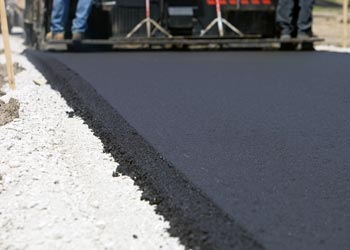Improve Safety and Accessibility: Hot Mix Asphalt for Angled Parking Lots
Exploring the Ecological Benefits of Warm Mix Asphalt
The application of Warm Mix Asphalt in framework tasks provides a compelling situation for sustainable growth and environmental stewardship. By diving right into the detailed information of its manufacturing processes and the innovative use of recycled products, a deeper understanding emerges of just how this technology surpasses plain surface applications. The environmental advantages of Hot Mix Asphalt extend far beyond initial impressions, supplying a nuanced perspective on just how this material can lead the method for a greener future.

Lowered Greenhouse Gas Emissions
The production process of Warm Mix Asphalt involves heating up the mixture of accumulation and asphalt binder to high temperatures. By including recovered asphalt sidewalk and recycled asphalt roof shingles into the mix, the requirement for virgin products is lowered, leading to energy cost savings and lowered emissions linked with extraction and processing.
Research studies have actually shown that Hot Mix Asphalt sidewalks have a smaller sized carbon footprint over their life cycle contrasted to various other sidewalk alternatives. The sturdiness and recyclability of Hot Mix Asphalt even more boost its environmental advantages by reducing the requirement for constant upkeep or replacement, consequently saving resources and reducing emissions connected with repair activities.
Power Performance and Conservation
The manufacturing procedure of Warm Mix Asphalt not only reduces greenhouse gas exhausts however likewise adds dramatically to power effectiveness and conservation efforts. Energy effectiveness is an essential benefit of Hot Mix Asphalt production compared to other sidewalk types. The procedure includes heating the products at heats to develop the asphalt mix, which requires much less energy than alternate approaches. Furthermore, the capability to reuse and recycle asphalt sidewalk additionally improves energy conservation. By incorporating redeemed asphalt sidewalk (RAP) right into new mixes, the industry saves power that would have been needed to generate totally new materials. The durability of Warm Mix Asphalt reduces the frequency of maintenance and repair, leading to long-term energy financial savings. This durability lessens the energy-intensive procedures involved in constant repairs and replacements. Overall, Warm Mix Asphalt stands out as an eco-friendly alternative that prioritizes power effectiveness and conservation throughout its lifecycle.
Sustainable Pavement Solutions

One secret element of sustainable sidewalk options is making use of recycled materials such as recovered asphalt pavement (RAP) and recycled asphalt roof shingles (RAS) By including these products into the asphalt mixtures, the need for virgin sources is reduced, bring about reduced energy intake and greenhouse gas emissions during manufacturing. In addition, the reuse of these materials assists divert waste from garbage dumps, adding to an extra round and sustainable economic situation.
In addition, sustainable pavement remedies focus on optimizing sidewalk design to improve performance and durability. Techniques such as cozy mix asphalt (WMA) and rock mastic asphalt (SMA) improve the longevity and strength of sidewalks, reducing the requirement for regular fixings and replacements. By applying these cutting-edge approaches, infrastructure developers can develop pavements that not just fulfill high-performance standards however additionally decrease their environmental impact.
Minimized Environmental Influence
Hot mix asphalt, in particular, offers several advantages that add to reducing the overall ecological footprint of road infrastructure. One vital aspect is the recyclability of asphalt, which can be recycled several times without jeopardizing its quality - Regrading.
In official statement addition, the production of hot mix asphalt gives off reduced levels of greenhouse gases compared to other sidewalk materials, making it a much more eco-friendly option. The energy performance of asphalt plants has also boosted for read here many years, causing minimized gas consumption and lower discharges. Furthermore, the smooth surface of warm mix asphalt decreases rolling resistance for lorries, resulting in lower fuel intake and lowered air contamination from automobile exhausts.
Payment to Environment Change Mitigation
Hot mix asphalt plays an essential role in mitigating climate adjustment via its sustainable residential or commercial properties and decreased ecological influence. One significant contribution to environment adjustment mitigation originates from the energy efficiency of warm mix asphalt production. Contrasted to various other sidewalk choices, the production process for warm mix asphalt eats less power and sends out reduced levels of greenhouse gases, hence reducing its general carbon impact.
Moreover, hot mix asphalt's ability to mirror sunlight, called albedo, aids in minimizing urban warm island results. By lessening warm absorption and retention, warm mix asphalt pavements can reduce the need for air conditioning in urban areas, as a result decreasing greenhouse gas exhausts linked with power usage for cooling down functions.
Furthermore, the durability and recyclability of warm mix asphalt even more improve its climate modification reduction abilities. Regrading. The lengthy lifespan of asphalt pavements minimizes the requirement for constant repair services or substitutes, ultimately reducing the carbon emissions connected to roadway maintenance tasks. The recyclability of asphalt materials minimizes the demand for virgin resources and decreases the ecological influence of pavement construction, lining up with lasting techniques for environment adjustment mitigation.
Conclusion
In verdict, the environmental advantages of Warm Mix Asphalt demonstrate its considerable contribution to reducing greenhouse gas exhausts, preserving power, and reducing ecological influence. This sustainable sidewalk option lines up with environment adjustment mitigation initiatives, promotes resource preservation, and improves framework growth. By using recycled products, energy-efficient production procedures, and resilient design, Warm Mix Asphalt plays a vital function in fostering a more ecologically friendly approach to infrastructure building and construction.
The manufacturing process of Warm Mix Asphalt involves warming the mix of accumulation and asphalt binder to high temperatures. By incorporating redeemed asphalt sidewalk and recycled asphalt shingles into the mix, the need for virgin products useful content is decreased, leading to energy savings and lowered discharges linked with removal and processing.
One secret facet of sustainable pavement remedies is the use of recycled products such as redeemed asphalt sidewalk (RAP) and recycled asphalt tiles (RAS) Methods such as cozy mix asphalt (WMA) and stone mastic asphalt (SMA) enhance the resilience and resilience of sidewalks, lowering the requirement for constant repair work and replacements. Compared to other sidewalk choices, the production procedure for warm mix asphalt consumes much less power and releases lower levels of greenhouse gases, thus minimizing its total carbon impact.